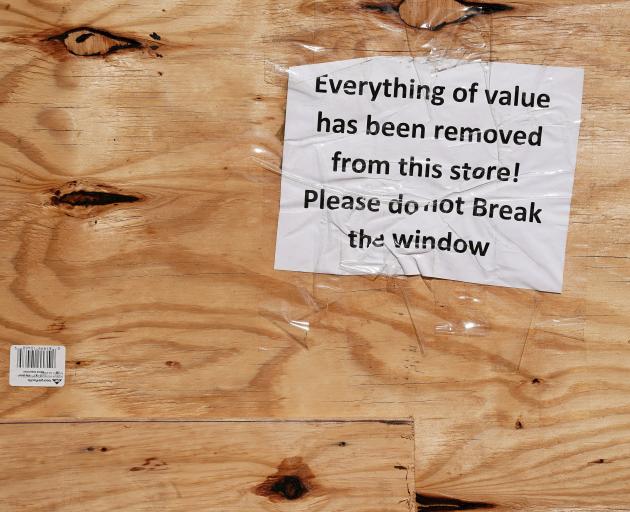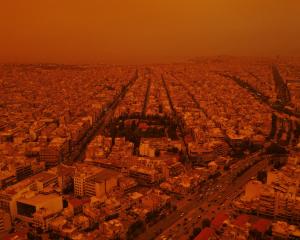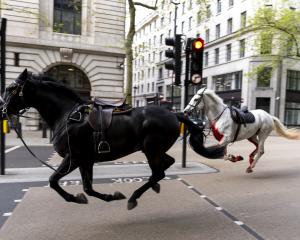Miami area police arrested more than 50 suspected looters during Hurricane Irma, including 26 people who were accused of breaking into a single Wal-Mart store, authorities say.
Residents who returned to the Florida Keys archipelago on Tuesday found Irma had shredded mobile homes and coated businesses with seaweed, while the death toll rose for the second major hurricane to hit the United States this year.
Irma caused widespread damage in Florida, weeks after Harvey inundated Houston and southeast Texas with record flooding last month.
Irma, one of the most powerful Atlantic hurricanes on record before it arrived in the US, killed 43 people in its rampage through the Caribbean and at least 12 in Florida, Georgia and South Carolina.
In Miami. city officials on Tuesday lifted a local 7pm to 7am curfew that had been in place since Sunday.
As normality began to return, police commanders said officers will work 12-hour shifts, 24 hours a day, to discourage any more criminality.
"I said we would not tolerate criminal activity or looting or anybody who takes advantage of our residents," Deputy Chief of Police Luis Cabrera said at a news conference. "I was not joking."
The Wal-Mart incident took place on Saturday night at a store on the north side of the City of Miami, said Miami-Dade Police Department spokesman Alvaro Zabaleta.
Among others suspected of looting were six men arrested on Monday and accused of breaking into stores at the Midtown Miami shopping complex, near the fashionable Wynwood district, before making off with merchandise that included shoes, bags and laptops.

The looting attempts spanned the city, said Miami Mayor Tomas Regalado, from the well-heeled Brickell and downtown neighborhoods to the low-income Liberty City and Little Haiti areas. He said police will stay vigilant as the cleanup goes on.
Officers have also been busy trawling roads that can be perilous for motorists because power cuts shut off traffic lights at intersections and streets have accumulated shredded vegetation spread by the storm's powerful winds.
"We have never experienced, not even with Hurricane Andrew, the amount of trees that are downed in the city," Regalado told the news conference. Hurricane Andrew hit Florida in 1992.
Since Irma began bearing down on the state late last week, authorities have been warning any would-be looters against taking advantage of the situation.
Rick Maglione, the police chief of Fort Lauderdale, about 48km north of Miami, told residents to stay home during the storm and look after their loved ones.
"Going to prison over a pair of sneakers is a fairly bad life choice," Maglione said in a statement.
Miami police posted a photo on Facebook of several accused looters sitting in a jail cell under the caption: "Thinking about looting? Ask these guys how that turned out. #stayindoors."
LIGHTS STILL OUR FOR MILLIONS
Some 6.1 million homes and businesses in Florida and nearby states still had no power on Tuesday after the pummeling from Irma, as utility companies scrambled to get the lights back on in one of the biggest power restoration efforts in US history.
The total number of customers, representing about 12.5 million people, dipped from a peak of more than 7.4 million customers, or about 15 million people, late on Monday.
Fuel shortages in the state also eased as 37.6% of gas stations were without fuel statewide, down from 46% on Monday evening, according to fuel information service GasBuddy.
TAX RELIEF
Tax-policy writers in the US House of Representatives are considering legislation to bring tax relief to businesses and individuals affected by Hurricanes Harvey and Irma, the top House lawmaker on tax issues said on Tuesday.
Representative Kevin Brady, Republican chairman of the House Ways and Means Committee, said staff was working with lawmakers from affected states to craft a bill that would help lessen the blow of property losses, facilitate access to retirement savings and encourage charitable giving.
He said the committee could act on legislation before October 1.
"They're really looking at how do we get our small businesses back up and running, how do we get customers to them and how do we help families and communities rebuild," Brady told reporters.
In past years, aides say Congress has sought to help disaster victims through a number of tax innovations including special tax credits for low-income housing, tax deferrals on gains from insurance payments and special refunds on tax filings from past years.












